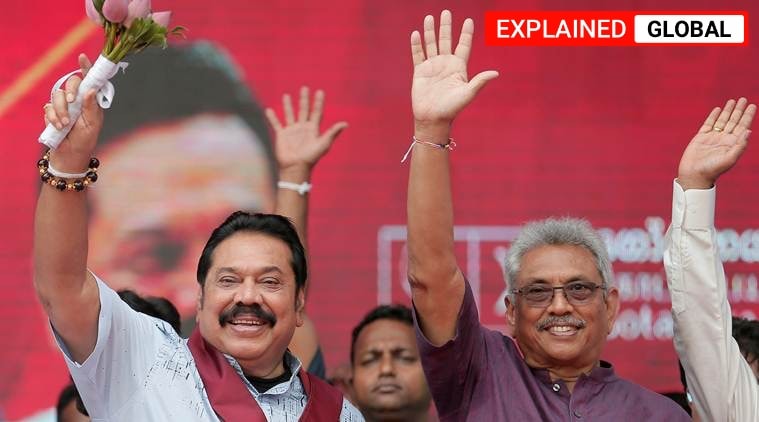Explained: Why Rajapaksa clan is likely to win the Sri Lanka parliamentary polls (original) (raw)
 The SLPP claims that the last eight months of the Gotabaya regime with a focus on economy and development has demolished charges that he stands for the majority Sinhalese alone. (Reuters Photo/File)
The SLPP claims that the last eight months of the Gotabaya regime with a focus on economy and development has demolished charges that he stands for the majority Sinhalese alone. (Reuters Photo/File)
Eight months after Gotabaya Rajapaksa won the presidential election, the Sri Lanka Podujana Peramuna (SLPP), a new party led by his elder brother Mahinda Rajapaksa that ensured Gotabaya’s victory, is tipped to win the parliamentary elections to be held Wednesday, August 5.
The election brings an end to constitutional uncertainties since President Gotabaya dissolved the parliament after his poll victory last year so as to let Mahinda become Prime Minister despite the SLPP not commanding a majority.

Parties in the fray
Over 16 million people are eligible to exercise their franchise to elect 225 lawmakers for the next five years.
Some 70 parties, 313 independent groups and 7,452 candidates are represented in this election with ballot papers. In the parliament, about two dozen seats from Sri Lanka’s northern and eastern provinces with minorities will play a key role against the ruling dispensation’s aspirations to achieve a two-third majority.
What has made a barely four-year old SLPP led by PM Mahinda Rajapaksa to have strong chances of victory is a weaker and divided opposition — United National Party (UNP), the main opposition party of former prime minister Ranil Wickremesinghe, and Samagi Jana Balawegaya (SJB), a breakaway faction of UNP led by Sajith Premadasa, who was defeated by Gotabaya in the presidential polls.
Even as SLPP backed by about nine smaller parties is unlikely to get a two-third majority, which is necessary to carry out any constitutional amendments, the fact that the mandate of country’s minority Tamils and Muslims, who voted against Gotabaya in the presidential polls, may be divided this time gives a stronger hope to the ruling dispensation.
A handful of political parties representing minorities play a crucial role as their performance in the election will define the unprecedented powers aspired by the Rajapaksa family.
The Tamil National Alliance (TNA), that always enjoyed a huge mandate of Tamils in northern Sri Lanka, faces a do-or-die situation owing to a growing mistrust among Tamils over TNA’s inaction and indifference to the cause of Tamils in the previous President Maithripala Sirisena government in power since 2015.
It is also significant for President Gotabaya to win maximum seats – not less than 130 – as the 19th amendment had reduced powers of the Presidency that were in force since 1978. With a decent victory, SLPP hopes that crucial decisions pending with regard to constitutional changes can be implemented.
📣 Express Explained is now on Telegram. Click here to join our channel (@ieexplained) and stay updated with the latest
Challenges of holding poll amid Covid-19
The conduct of the election amid Covid-19 makes it the most expensive election in the history of Sri Lanka. Over 8,000 health officials will be assisting about 69,000 police personnel during the polling to ensure the exercise of the voting rights of voters including those in quarantine.
In a country that largely survives on export manufacturing and tourism, the impact of Covid-19 would be the biggest challenge on Sri Lanka’s economy.
It is expected that the post-epidemic period coupled with the challenges of a huge public debt, mostly owed to China, will make Sri Lanka’s economy weaker and vulnerable
A national labour department survey on the impact of Covid-19 estimates that around 300,000 employees will be terminated in the formal private sector in the short term if the status of businesses doesn’t improve.
Raising alarm at the chances of a steady increase in the current rate of unemployment in Sri Lanka, the survey also says remittances, about 8% to 9% of GDP, was drastically declining and “it is expected that a significant number of migrant workers will return due to non-availability of demand for their work in destination countries.”
While the country’s rural economy was always poorer and weaker, some 50 per cent of job losses have made the situation worse in Sri Lankan villages.
What next in country’s policies, politics
At a time when parties like TNA are losing their political monopoly over Tamil minorities, and the further strengthening of powers in favour of the Rajapaksa family, which is backed by majority Sinhalese Buddhist voters, policies and politics of President Gotabaya are going to be crucial for Sri Lanka after election.
The SLPP claims that the last eight months of the Gotabaya regime with a focus on economy and development has demolished charges that he stands for the majority Sinhalese alone. However, it remains uncertain whether the political opposition of Sri Lanka would be strong enough to play the role of opposition and to protect the rights of minorities in a country that witnessed ethnic and racial conflicts for several decades.
Discover the Benefits of Our Subscription!
Stay informed with access to our award-winning journalism.
Avoid misinformation with trusted, accurate reporting.
Make smarter decisions with insights that matter.
Choose your subscription package